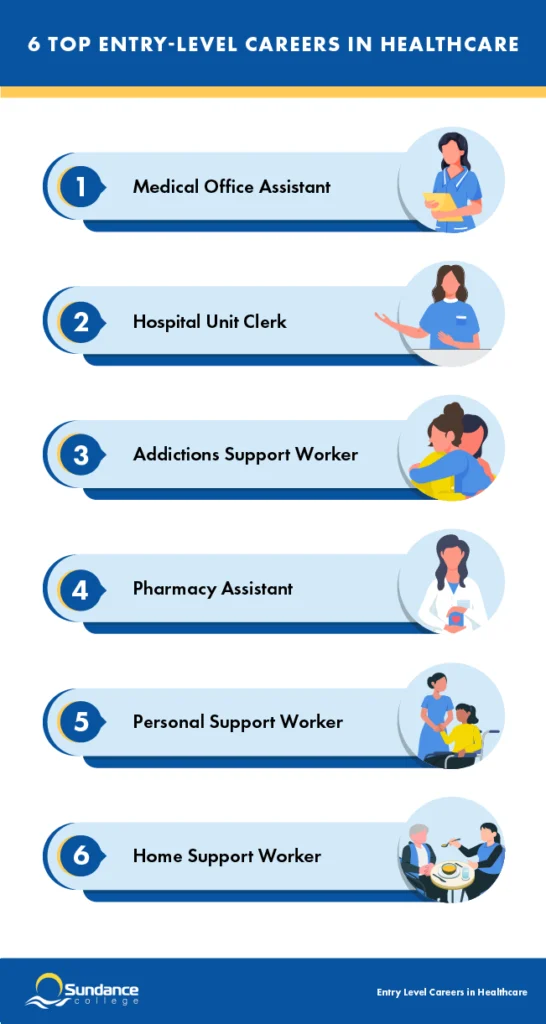Blog / Entry Level Careers in Healthcare
Entry Level Careers in Healthcare

Explore our Diploma Programs
- Business, Hospitality, and Legal
- Health and Human Services
- Technology
Table of Contents
If you’re looking for a way to start a career in healthcare, there are many options to consider. Some of the most in-demand healthcare professions for 2025 include medical office assistant, hospital unit clerk, family support worker, pharmacy assistant, personal support worker, and home support worker. In this article, we’ll break down these healthcare career paths and explain the skills you’ll need and the steps to get started.
Listen to “Entry Level Careers in Healthcare”
Why Choose a Career in Healthcare?
Healthcare is one of the professions with the best career opportunities in Canada for 2025. With a growing need for skilled and dedicated workers, it’s a field full of potential. Here’s why it might be the right choice for you:
- Meaningful work: You’ll have the chance to help people when they need it most, whether it’s through direct care, support, or behind-the-scenes coordination.
- High demand: With an aging population, healthcare job opportunities are growing, and there’s a strong need for entry-level workers.
- Quick start: You can train and be prepared for many roles in less than a year.
- Room to grow: Healthcare offers opportunities to advance your career.
- Stability: Healthcare is always in demand, making it one of the most reliable occupations for long-term job security.
If you’re looking for a career that’s both practical and rewarding, healthcare has a lot to offer.
Top In-Demand Entry-Level Careers in Healthcare for 2025

Here are six in-demand entry level healthcare careers as of 2025 and what you can expect in each:
1. Medical Office Assistant
What you’d do: The day-to-day responsibilities of a medical office assistant include handling administrative tasks like scheduling appointments, managing patient records, and assisting with billing in a clinic or doctor’s office.
What you’d need: A diploma program in medical office administration and strong organizational skills.
What you’d make: Up to $52,763 per year, depending on your location and experience.
“The flexibility of the medical office assistant role is one of its biggest strengths,” shares Moe S., an instructor of Sundance College’s MOA diploma program. “Our graduates often start in clinics, but their skills are transferable to hospitals, dental offices, and even public health settings.”
2. Hospital Unit Clerk
What you’d do: Coordinate communication and manage paperwork in hospital units, including processing physician orders and assisting staff with administrative needs.
What you’d need: A diploma program, along with good communication and multitasking skills.
What you’d make: Up to $52,763 per year in usually a unionized environment.
Both medical office administration jobs and hospital unit clerk roles involve handling administrative tasks, managing records, and supporting healthcare staff, making organization and communication key skills for both positions. However, while MOAs typically work in clinics or doctor’s offices, unit clerks focus on hospital settings, where they manage patient information and assist with physician orders.
3. Addictions Support Worker
What you’d do: Addictions workers provide emotional and practical support to individuals and families dealing with substance use challenges and related mental health issues.
What you’d need: An addictions and community health worker training program. Compassion, active listening, and problem-solving skills are essential.
What you’d make: Up to $63,500, which varies based on work location and experience.
Discover 7 key career paths for addictions and community health workers to learn more about how you can make an impact in this field.
4. Pharmacy Assistant
What you’d do: The pharmacy assistant job description involves assisting pharmacists by organizing medications, managing inventory, and assisting customers with basic questions.
Our Pharmacy Assistant diploma instructor Nour S. adds,
“The demand for pharmacy assistants is fueled by the growing need for accessible healthcare and the increasing role of pharmacies in providing everyday health services. We focus on teaching our students practical skills, including managing prescriptions, understanding medication classifications, and providing excellent customer support, making sure they are workforce ready.”
What you’d need: A pharmacy assistant diploma program with practical training. Attention to detail and customer service skills are key.
What you’d make: It varies by location. Annual salary can reach $56,350.
Pharmacy assistants can pursue various career paths in retail pharmacies, hospital settings, or pharmaceutical companies. Learn more about the different career opportunities available for pharmacy assistants and how this role can lead you to career growth in the healthcare industry.
5. Personal Support Worker
What you’d do: Personal support workers provide hands-on care to patients, such as helping with daily tasks like bathing, dressing, mobility, and taking medicine.
What you’d need: A personal support worker diploma and a passion for working closely with people. Physical stamina is important too.
What you’d make: Salary will vary by work location, such as institution versus in-home, as well as geographic location and work experience. Earn up to $45,385.
“With an aging population and more older Canadians choosing to stay at home, the personal support worker job outlook remains consistently strong,” shares PSW instructor Ethelyn W. “To meet the needs of clients and families, our students get real-world training in areas like mobility assistance, palliative care, and managing chronic conditions necessary for them to excel as personal support workers in various settings.”
6. Home Support Worker
What you’d do: Assist clients in their homes who have lighter personal care and daily living needs, related to light housekeeping, meal preparation, and sometimes basic medical care.
What you’d need: A personal support worker diploma. A caring and patient nature is a must.
What you’d make: Within the same range as above.
Personal support workers have access to a variety of rewarding paths, including various community health roles, long-term care careers. Explore additional career options available for personal support worker graduates.
Skills Required for Entry-Level Healthcare Careers
Starting a career in healthcare requires some key skills you’ll need to succeed. Here’s what employers typically look for:
- Communication skills: Whether you’re talking to patients, families, or coworkers, clear and compassionate communication is essential.
- Organization skills: Many roles involve managing schedules, records, or other details, so being organized is a must.
- Teamwork: Healthcare is a team effort, so being able to work well with others is important.
- Problem-solving: You’ll often need to think on your feet and find solutions to challenges as they come up.
- Empathy: Understanding and caring for others is at the heart of most healthcare roles.
- Attention to detail: Accuracy is critical, especially when working with patient information or medications.
- Flexibility: Healthcare jobs in 2025 offer dynamic environments, where adaptability allows professionals to thrive and excel.
Developing these healthcare job skills through hands-on education and practicum is important for aspiring healthcare professionals, as it provides the practical experience needed to stand out as a strong candidate for healthcare entry-level positions.
Steps to Begin Your Healthcare Career
Getting started in healthcare is simpler than you might think. Follow these steps to make your transition happen:
- Research roles: Explore different entry-level jobs in healthcare to find one that fits your interests and strengths.
- Get the right training for healthcare careers: Enroll in one of our health diploma programs for the role you’re interested in, such as medical office administrator or personal support worker.
- Gain experience: Make the most of your practicum placement as part of your program in a healthcare setting to build experience and learn more about the industry.
- Build your resume: Highlight your skills, training, and any relevant experience, including your practicum. Include examples that show your communication, organization, and teamwork abilities.
- Apply for high demand healthcare jobs: Take advantage of Sundance Career Services job search and resume preparation support. Tailor your applications to the role and employer you are applying to.
- Be ready to grow: Once you’re in, stay open to learning new skills or pursuing additional certifications to advance your career over time.
“We work closely with our students from day one of their program through to job placement after graduation,” says Tim H., a career services advisor at Sundance College. “This isn’t just talk — we currently have nearly 2,700 employer and practicum partners on our contact list, and that number keeps growing.”
Healthcare offers so many rewarding opportunities, and there’s no better time to get started. Whether you’re drawn to working directly with patients, helping behind the scenes, or providing support to families, there’s a role in healthcare that’s perfect for you.
Not sure which path is right for you? Take our career quiz to discover which healthcare job matches your personality and skills. You can also learn more about how our career college diploma programs can help you start your healthcare career.
Related Blogs
Subscribe for more career advice
Blog Categories
Share on:
